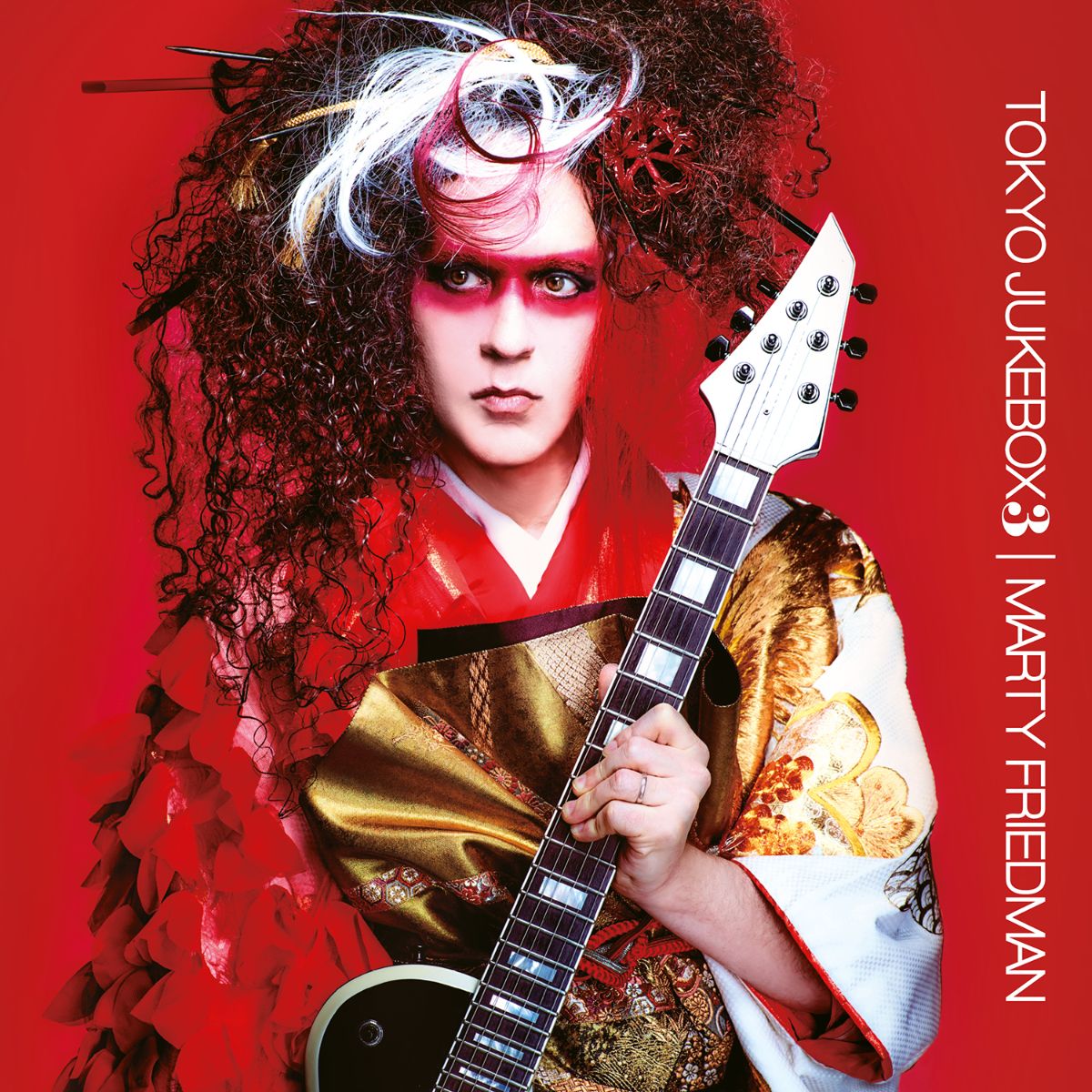ALBUM REVIEW: Tokyo Jukebox 3 – Marty Friedman
To many, MARTY FRIEDMAN is best known as the axeman for the ‘classic’ era of MEGADETH. As remarkable as he was in that position, his solo work is also deserving of reverence, with albums such as Scenes and Inferno perhaps best showcasing the sonic spectrum of his characteristically melodic guitar playing. Although present in some capacity throughout a lot of his work, since relocating to Japan nearly two decades ago, Friedman’s music has been even further influenced by the local musical language. His Tokyo Jukebox series of albums takes that one step further, with Friedman producing primarily instrumental, rock-centric covers of Japanese songs, ranging from J-pop to metal and everything in-between. In Tokyo Jukebox 3, Friedman and his collaborators continue their mission of filtering Japan’s music through a stack of guitar amps.
Although pulling from a pool of varied material, Tokyo Jukebox 3 stylistically continues down the same path of most of Friedman’s post-2000 releases – energetic hard rock with sonorous guitar melodies leading the charge. At its best, the imprint of that aural aesthetic on these covers creates versions that feel almost completely original, yet still retain enough of the source’s spirit to ground them. In its first incarnation by IKIMONI GAKARI, Kaze Ga Fuiteru is a heartfelt pop ballad resplendent with elaborate string sections, delicate pianos and a charmingly maudlin vocal performance at its centre. Tokyo Jukebox 3 takes the song’s tasteful bombast and amps it up into a pop-punk-meets-arcade-sound guitar jam. The driving rhythm guitars and cruising leads wouldn’t feel out of place on the soundtrack to Outrun 2, and the outro of jazzy piano and bluesy guitar licks provide a final nod to the previous ballad. The result is something that at once feels true to its source whilst also unmistakably Marty Friedman.
By a similar token, Friedman’s rearrangements can make songs of an acquired taste enjoyable. In its original guise, Senbonzakura is a borderline unbearable Vocaloid J-pop number. On Tokyo Jukebox 3, it’s retooled as an instrumental showcase for both Friedman and bassist extraordinaire, Kiyoshi. The solo section sees Friedman’s ascending leads perfectly punctuated by Kiyoshi’s pounding bass fills, while the composition dips in and out of djent-inspired riffery. All the while, Senbonzakura is tied back to its initial version via a recurring guitar motif based on the Vocaloid vocal hook.
Not all songs see such dramatic changes, of course, with Demon Slayer’s theme Gurenge proving less extreme a reinterpretation. The version here embraces Gurenge’s heavy instincts during its fiery choruses, but also sees MARTY FRIEDMAN and band strip things back during the verses, allowing guitar lines to be reeled off front and centre.
With so much going on, the biggest criticism that could be levied at Tokyo Jukebox 3 is a lack of variety. This is not a result of the source material itself – indeed, Friedman’s song choices are enjoyably eclectic and genre-hopping – but rather from some of the arrangement choices made. Truly Friedman has made these tunes his own, but in doing so has doubled down on primarily turning them in to lightning-fast hard rock numbers with occasional metal dalliances. It is a blast in small doses, but starts to wear thin towards the album’s end. It’s telling that one of the album’s standouts is its only vocal cut, Perfect World – a self-cover of a composition Friedman contributed to anime B: The Beginning. The arrangement here sees the track reinvigorated from a grungy dirge to a powerful anthem, helped in no small part by the excellent pipes of singer Alfakyun. Considering that nearly all the material on Tokyo Jukebox 3 originally bore lyrics, Perfect World begs the question whether the album would be more engaging with at least a few more vocal collaborations peppered throughout.
Then again, maybe that’s not the point of Tokyo Jukebox 3. Anyone stepping in to listen to a MARTY FRIEDMAN solo album is most likely looking for incredible guitar playing above all else. Make no mistake about it, Friedman’s playing throughout Tokyo Jukebox 3 is as exhilarating as ever, and his rhythm section of Kiyoshi and drummer Anup Sastry are more than able to keep up, adding their own brilliant flourishes throughout. As an introduction to Japanese acts, it’s unlikely that Tokyo Jukebox 3 will turn hardened guitar freaks in to devoted MOMOIRO CLOVER Z fans. However, for the small and dedicated overlap on the Venn diagram between virtuosic guitar and modern Japanese music, Tokyo Jukebox 3 provides a great selection of music skilfully reinvented by a guitar master.
Rating: 7/10

Tokyo Jukebox 3 is out now via The Players Club.
Like MARTY FRIEDMAN on Facebook.

